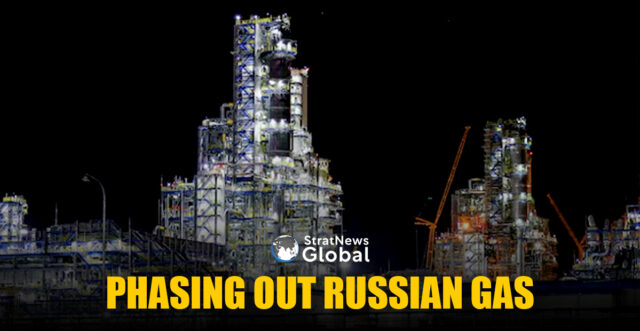The European Commission announced on Tuesday that it will propose legal measures next month to phase out all European Union (EU) imports of Russian gas and liquefied natural gas by the end of 2027.
The European Union vowed to end its decades-old energy relations with former top gas supplier Russia after Moscow’s full-scale invasion of Ukraine in 2022. The Commission outlined how it plans to do this in a “roadmap” published on Tuesday.
Legal Proposal In June
The EU executive will present a legal proposal in June to ban remaining Russian gas and liquefied natural gas (LNG) imports under existing contracts by end-2027, it said.
The Commission will also propose in June a ban on Russian gas imports under new deals and existing spot contracts by the end of 2025.
“It is now time for Europe to completely cut off its energy ties with an unreliable supplier. And energy that comes to our continent should not pay for a war of aggression against Ukraine,” European Commission President Ursula von der Leyen said in a statement.
A draft of the EU roadmap was previously reported by Reuters.
America’s Peace Push
The U.S. is pushing Russia for a peace deal with Ukraine, which, if reached, may reopen the door for Russian energy and ease sanctions. But while executives in some EU industries have signalled support for a return to Russian gas, the EU is pressing ahead with efforts to cut decades-old energy ties with Moscow.
Around 19% of Europe’s gas still comes from Russia, via the TurkStream pipeline and liquefied natural gas shipments – down from roughly 45% before 2022.
The European Commission has signalled willingness to buy more U.S. LNG to replace Russian volumes, a step President Donald Trump has demanded as a way of shrinking the EU’s trade surplus with the United States.
Approval Needed
The Commission did not specify what legal options it plans to use to allow European companies to break their existing Russian gas contracts.
New EU legislative proposals need approval from the European Parliament and a reinforced majority of EU countries.
The EU has imposed sanctions on Russian coal and most oil imports, but not on gas due to opposition from Slovakia and Hungary, which receive Russian pipeline supplies and say switching to alternatives would hike energy prices. Sanctions require unanimous approval from all 27 EU countries.
EU countries will be required to produce national plans for phasing out Russian gas and oil in the case of Slovakia and Hungary, which still import more than 80% of their oil from Russia.
Global LNG supply is expected to remain tight this year, but with fresh supply due from 2026 in countries including the U.S. and Qatar, a global surplus is expected by 2030, the International Energy Agency has said.
The Commission said its proposals, if implemented alongside global market developments, should limit any impact that phasing out Russian gas would have on European energy prices.
EU Bets On Renewables
The EU is also betting on renewable energy to slash its overall fossil fuel use.
European buyers still have “take-or-pay” contracts with Gazprom, which require those who refuse gas deliveries to pay for much of the contracted volumes.
Lawyers have said it would be difficult to invoke “force majeure” to quit these deals without exposing buyers to financial penalties or arbitration.
The EU imported 32bcm of Russian gas via pipeline and 20bcm of Russian LNG last year. Overall, two-thirds of this supply is under long-term contracts, while one-third is uncontracted “spot” purchases.
The Commission will also propose measures next month targeting Russian enriched uranium, including restrictions on new supply contracts co-signed by the Euratom Supply Agency, it said.
(With inputs from Reuters)





